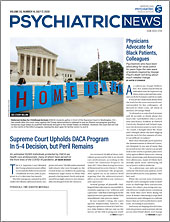Centanafadine Shows Promise for Adult ADHD
Centanafadine, a serotonin-norepinephrine-dopamine triple-reuptake inhibitor in development by Otsuka Pharmaceuticals, improved symptoms of attention-deficit/hyperactivity disorder (ADHD) in adults in two phase 3 trials, the company announced in June.
In the trials, approximately 900 patients with ADHD aged 18 to 55 years were randomized to receive either 100 mg or 200 mg of centanafadine twice a day or placebo for six weeks.
Compared with patients who took placebo, those who took centanafadine had greater improvements in their scores on the adult ADHD Investigator Symptom Rating Scale and the Clinical Global Impression–Severity Scale at the end of six weeks. The most common side effects, which occurred in fewer than 7% of patients, were decreased appetite, headache, nausea, dry mouth, upper respiratory tract infection, and diarrhea.
Dayvigo for Insomnia Now Available
Dayvigo (lemborexant) is now available for treating insomnia in adults who experience trouble falling or staying asleep. The drug is available in 5 mg and 10 mg tablets and should be taken once a night before bedtime, at least seven hours before patients plan to wake up.
Lemborexant, by Eisai Co. Ltd., was approved by the Food and Drug Administration (FDA) last December based on data from two phase 3 clinical trials in adults. SUNRISE 1 evaluated the efficacy and safety of lemborexant versus placebo and versus an active comparator (zolpidem tartrate extended release) in 1,006 patients aged 55 years and older. SUNRISE 2 evaluated the long-term efficacy and safety of lemborexant in 949 patients aged 18 to 88 years. In both studies, lemborexant met its endpoints of improving sleep latency and efficiency.
Lemborexant is a Schedule IV controlled substance. Patients who have a history of substance use disorder or alcohol use disorder may have an increased risk of addiction to lemborexant and should be followed carefully.
FDA Issues Guidance on Digital Health Devices for MH During COVID-19
The FDA has released guidance for industry to help expand the availability of computer programs and mobile apps for mental health disorders during the COVID-19 pandemic. The guidance is meant to “facilitate consumer and patient use while reducing user and health care provider contact and potential exposure to COVID-19 during this pandemic,” the agency noted.
In the guidance, the FDA waived certain regulatory requirements for distributing digital health technologies for psychiatric disorders as long as they “do not create an undue risk.” For example, the policy waives 510(k) clearance for prescription-only apps or programs that are “intended to provide a computerized version of a condition-specific behavioral therapy as an adjunct to clinician-supervised outpatient treatment.” These technologies may provide tools to enhance cognitive-behavioral therapy.
The FDA has also relaxed requirements for products that have software that promotes general wellness, such as relaxation, stress reduction, and better sleep.
“Enforcement Policy for Digital Health Devices for Treating Psychiatric Disorders During the Coronavirus Disease 2019 (COVID-19) Public Health Emergency” is posted
here.
Pimavanserin May Improve Sexual Function in Patients with MDD
Nuplazid (pimavanserin) may improve sexual function in patients with major depressive disorder (MDD) when added to their existing treatment, a study in Depression & Anxiety has found.
Marlene Freeman, Ph.D., and researchers at Massachusetts General Hospital examined data from the CLARITY study in which 203 patients with MDD were randomized to 34 mg a day of pimavanserin or placebo for five weeks. All patients were experiencing a depressive episode, had inadequate response to ongoing antidepressant therapy, and had a Montgomery-Åsberg Depression Rating Scale total score of more than 20.
Compared with the placebo group, those in the pimavanserin group had greater improvements on the Massachusetts General Hospital Sexual Functioning Index and Item 14 of the Hamilton Depression Rating Scale, which assesses sexual interest, at the end of the fifth week.
“Improvement of Sexual Functioning During Treatment of MDD With Adjunctive Pimavanserin: A Secondary Analysis” is posted
here.
Meloxicam/Rizatriptan Combination Drug Shows Promise for Migraine
An investigational combination medication that includes the nonsterioidal anti-inflammatory drug meloxicam and the headache drug rizatriptan substantially eliminated migraine pain in the phase 3 INTERCEPT trial, Axsome Therapeutics announced in April. The drug, AXS-07 (20 mg meloxicam/10 mg rizatriptan), also significantly prevented the progression of migraine pain intensity.
In the trial, 302 patients received either a single dose of AXS-07 or placebo at the earliest sign of migraine pain, when pain was mild. Two hours after dosing, 32.6% of those who took AXS-07 were free from migraine pain, compared with 16.3% who took placebo. Among those who took AXS-07, 43.9% were free of their most bothersome symptom, such as nausea or sensitivity to light, two hours after dosing, compared with 26.7% in the placebo group.
AXS-07 prevented migraine pain from progressing beyond mild from two to 24 hours after dosing in 73.5% of the patients who took it, compared with 47.4% of those who took placebo. Only 15.3% of patients who took AXS-07 required rescue medication through 24 hours after dosing, compared with 42.2% of those who took placebo. ■
